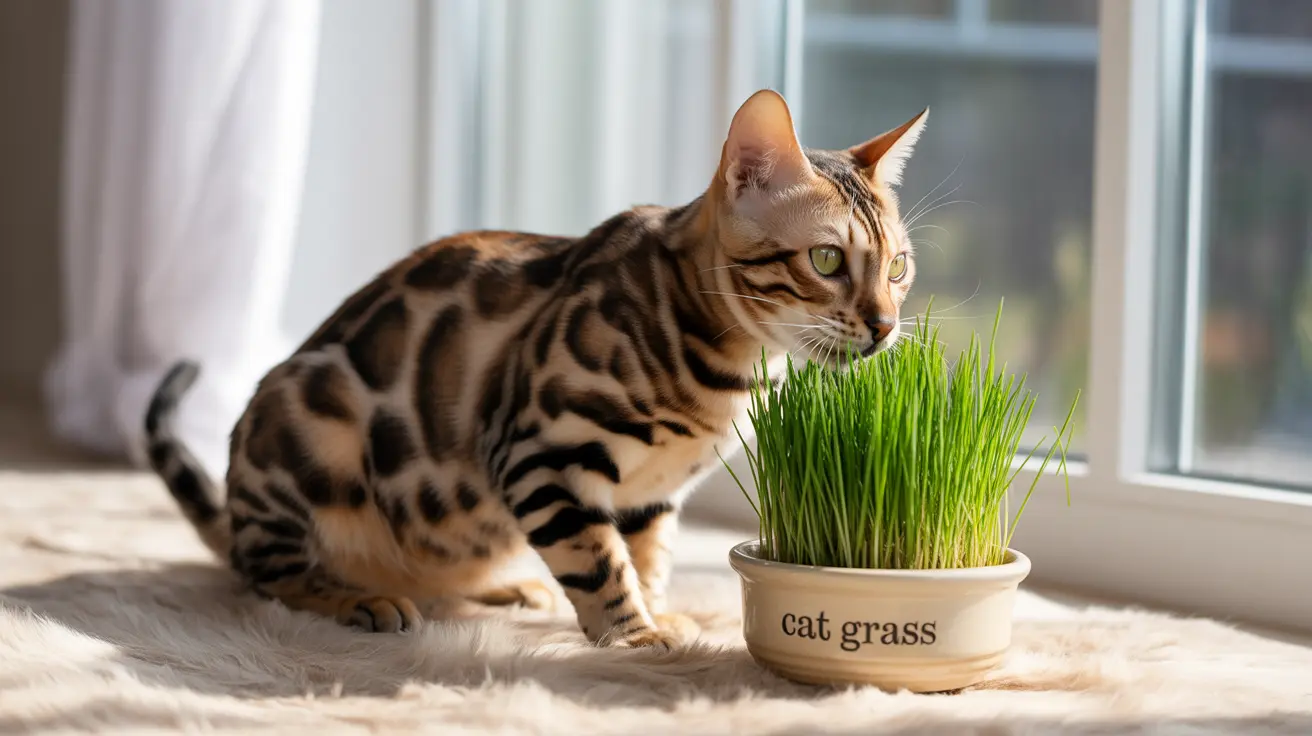If you've ever caught your cat munching on grass, you're not alone. This seemingly peculiar behavior is actually quite common among our feline friends, with studies showing that over 70% of cats regularly engage in grass eating. While it might appear strange for these carnivorous creatures to snack on greenery, there are several fascinating explanations behind this natural instinct.
Understanding why cats eat grass can help pet owners better support their furry companions' natural behaviors while ensuring their safety. Let's explore the science behind this common feline habit and learn how to manage it appropriately.
The Evolutionary Purpose of Grass Eating
Recent research suggests that grass eating isn't just a random behavior but rather an inherited survival mechanism. Wild cats developed this habit as a natural way to expel intestinal parasites by increasing muscle activity in their digestive tract. Even though modern domestic cats rarely face parasitic infections, this ancestral instinct remains deeply ingrained in their behavior.
This evolutionary adaptation demonstrates how our pets retain behaviors that once served crucial survival purposes in their wild ancestors, even in the comfort of our homes.
Digestive Benefits and Natural Cleansing
One of the primary reasons cats eat grass is its role in digestive health. The natural fiber in grass can help cats in several ways:
- Assists in expelling indigestible materials like fur and feathers
- Acts as a natural laxative to prevent constipation
- Helps move hairballs through the digestive system
- Provides beneficial fiber for gut health
While some cats may vomit after eating grass, this isn't necessarily a negative outcome. Only about 25% of grass-eating episodes result in vomiting, suggesting that regurgitation isn't the primary purpose of this behavior.
Nutritional Aspects of Grass Consumption
Grass contains several nutrients that can benefit cats, particularly folic acid (vitamin B9). This essential nutrient plays a vital role in:
- Supporting healthy cell growth and division
- Maintaining proper digestion
- Producing red blood cells
- Aiding in DNA synthesis
While cats should get most of their nutrients from their regular diet, grass can serve as a natural supplement to their nutritional intake.
Safety Considerations for Grass-Eating Cats
While grass eating is natural, cat owners should take certain precautions to ensure their pets' safety:
- Provide cat-specific grass (wheat, oat, or rye grass) grown indoors
- Ensure outdoor grass hasn't been treated with pesticides or herbicides
- Keep toxic plants out of reach
- Monitor for excessive grass consumption or frequent vomiting
Growing "cat grass" indoors is the safest option, as it eliminates exposure to harmful chemicals and parasites that might be present in outdoor vegetation.
Supporting Your Cat's Natural Instincts
To safely accommodate your cat's grass-eating behavior:
- Plant cat grass in easily accessible containers
- Maintain a regular supply of fresh, clean grass
- Replace the grass when it becomes wilted or yellowed
- Position grass containers away from toxic houseplants
This approach allows cats to fulfill their natural instincts while keeping them safe from potential hazards.
Frequently Asked Questions
Why do cats eat grass, and is it a sign of illness?
Cats eating grass is typically not a sign of illness but rather a natural behavior with evolutionary roots. While some cats may eat grass when feeling unwell, most do so as part of their normal behavioral repertoire.
Can providing cat grass help improve my cat's digestive health?
Yes, cat grass can support digestive health by providing natural fiber and helping move hairballs and other indigestible materials through the digestive tract.
How can I ensure my cat is eating safe grass without harming their health?
Grow cat grass indoors using commercial kits or seeds specifically marketed for cats. Avoid letting your cat eat outdoor grass that may have been treated with chemicals or pesticides.
Does eating grass help cats expel hairballs or indigestible materials?
Yes, grass can help cats expel hairballs and other indigestible materials either through natural passage or occasional vomiting, though this isn't its only purpose.
Is it necessary to include grass in my cat's diet for nutritional reasons?
While grass isn't nutritionally essential for cats on a complete and balanced diet, it can provide supplemental benefits like folic acid and fiber. It's more important to ensure your cat's primary diet meets all their nutritional needs.
Conclusion
Understanding why cats eat grass helps us appreciate this natural behavior as part of their evolutionary heritage rather than a cause for concern. By providing safe access to cat grass and monitoring their consumption, we can support our feline friends' natural instincts while ensuring their well-being.






